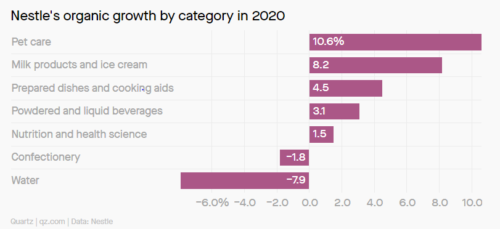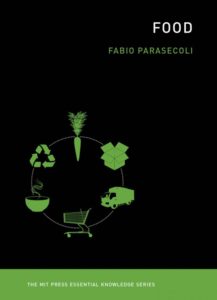Some musings about pet foods
Pet foods may seem unrelated to food politics but they constitute a vital part of the food system For one thing, they use up a large part of the byproducts of human food production that would otherwise be wasted.
They also are big business. The US pet foods brought in $99 billion in sales in 2020.
Nestlé (no relation) is one of the largest pet food producers. As Quartz puts it, Nestle’s big bet on pet food is paying dividends during the pandemic.
A beloved animal friend for you means big business for Nestle. According to an earnings report released today, the Swiss company reported 3.5% organic growth so far in 2020, and 4.9% growth in the third quarter, its highest level of quarterly growth in the past six years…its pet food brand, Purina PetCare, was a main contributor in each of the company’s global markets, growing 10.6% so far this year, CFO Francois-Xavier Roger said on a call for investors.
To my great amusement, pet food marketing closely follows current food fads. Why am I amused? Dogs don’t care what they eat, but their humans do.
- Cell-based meat for pets: A handful of startup companies are using cell-based meat in pet food, a large market now supplied by food-bearing animals; one uses cells from mice for cat food and cells from rabbits for dog food. (Modern Farmer)
- Unleash the Power of Postbiotics in Pets: Pet parents continue to turn towards natural foods, recognizable ingredients, and supplements. As this trend and purchasing pattern continues, we see another ingredient category emerge – Postbiotics. Read more
And we now have insect-based pet foods.
- Insect protein demand by pet food may be 165k tons by 2030: As a pet food ingredient, insect meal can serve as an alternative protein source for dogs and cats with allergies or sensitivities. The pet food market currently accounts for the largest share of demand for insect protein and is likely to remain one of the largest, one industry professional said.Read more
- Insect-based pet foods not risk for zoonotic pandemic: A team of researchers at Ÿnsect has been working to assess potential risks from mealworm farming operations. Read more
- Insect-based pet food news: Like insects themselves emerging in spring, insect-based pet food ingredient suppliers and the products that use them have been active lately. Mars Petcare plans to introduce an insect-based cat food, Lovebug, in the United Kingdom.
Pet food safety is an ongoing issue, particularly from Salmonella contamination. What interested me about this particular recall—Billy+Margot Wild Kangaroo and Superfoods Recipe Dog Food—was its main ingredient, wild kangaroo, and that it is being marketed as a superfood (no such thing exists).
If you have purchased Billy+Margot Wild Kangaroo and Superfoods Recipe in a 4 lb bag, with lot code V 07 Feb 2022 from any retail store nationally, please stop feeding the product to your dogs, dispose of this product immediately, wash your hands accordingly, and sanitize affected surfaces.
Weight loss in dogs and owners: If one loses weight, the other does too!
My ongoing interest in this topic is a result of having written two books about pet foods:
- Pet Food Politics: The Chihuahua in the Coal Mine (2008)—an account of the pet food recalls of 2007 and their implications for the health of dogs and cats, but also for the FDA, food safety policy in the United States and China, international food trade, and the pet food industry itself.
- Feed Your Pet Right (with Malden Nesheim, 2010)—an examination of the booming pet food industry—its history, constituent companies, products, and marketing practices.





